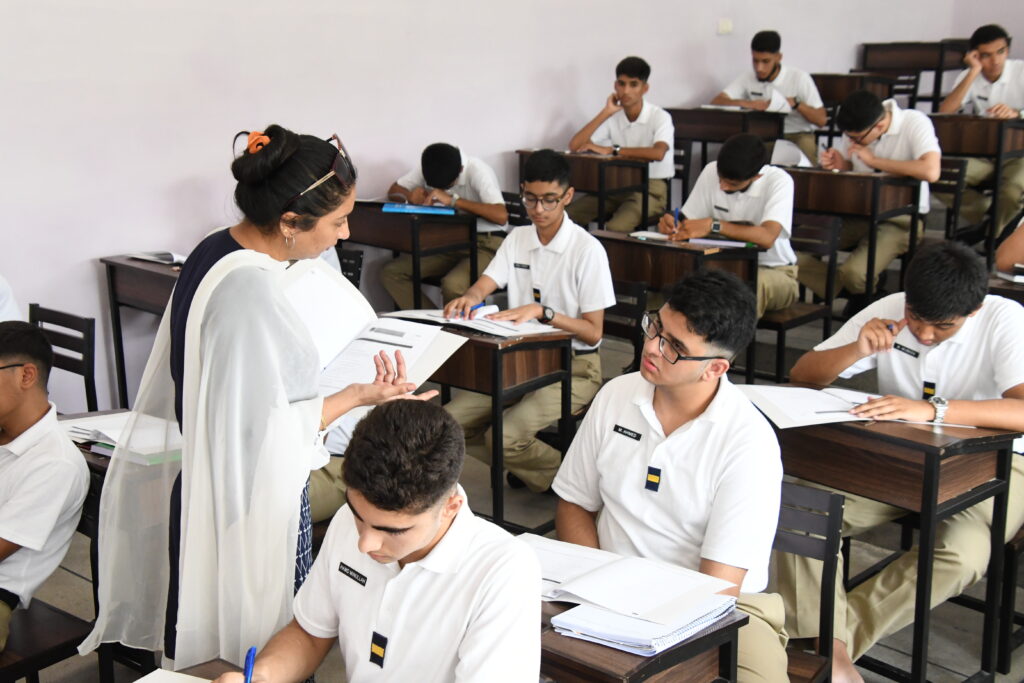Introduction to Well-being & Counselling Services:
Our vision at the Student Well-being and Psychological Services is to inspire and foster the well-being of students at Cadet College Hasanabdal. We envision a supportive environment that goes beyond academic excellence, focusing on the holistic development of each student. Our aim is to nurture resilient leaders equipped with emotional intelligence, integrity, and a strong sense of purpose. By providing comprehensive psychological support and well-being initiatives, we strive to prepare students not only for academic success but also to become compassionate, creative, and influential leaders in their chosen fields. Through this vision, we aspire to contribute to the overarching mission of Cadet College Hasanabdal in shaping ABDALIANS into 21st Century Global Leaders.


Psychological/Well-being Profiling for Cadet Selection and Adjustment:
At Cadet College Hasanabdal, we place great emphasis on the holistic development and well-being of our students. In line with this vision, psychological/well-being profiling is an integral part of the admission process for both 8th grade and 1st year (new entrants).
This comprehensive psychological/well-being assessment serves a dual purpose:
- To identify candidates who are best suited for the rigorous and structured environment of CCH, ensuring alignment between the student’s psychological readiness and the demands of residential life.
- To facilitate the emotional and social adjustment of selected cadets, through informed and individualized support provided during follow-up counselling sessions.
Each candidate undergoes a confidential psychological/well-being evaluation, which includes standardized screening tools, behavioral observations, and one-on-one interactions conducted by qualified professionals. The insights gathered are used not only to guide selection but also to design personalized adjustment and mentoring plans for the admitted cadets.
As per the directions of the Board of Governors, this process is conducted with the highest standards of discretion, sensitivity, and professional ethics. The confidentiality of every candidate’s psychological/well-being profile is strictly maintained, and access is limited only to authorized personnel involved in student support.
Through this approach, Cadet College Hasanabdal reaffirms its commitment to fostering an emotionally resilient, socially responsible, and psychologically prepared student body.


Group Orientation Sessions for New Entrants:
At Cadet College Hasanabdal, we recognize that the initial transition into a boarding school environment can be both exciting and challenging for young students. To ensure that every student feels supported from the very beginning, we conduct structured group orientation sessions for all new entrants both Class 8 cadets and Direct Entrants to 1st Year.
Led by the college psychologist/wellbeing counselor in close collaboration with the Housemasters, these sessions are a key part of our mental health and well-being strategy. They are designed not only to welcome students but to equip them with the emotional tools needed to navigate this important life transition successfully.
Collaboration with Housemasters:
A defining strength of this program is the close coordination with Housemasters, who play a central role in the pastoral care of cadets. Housemasters reinforce the key messages from these sessions in day-to-day interactions and serve as the first point of contact for ongoing emotional or behavioral observations. This teamwork ensures that students receive consistent guidance and support across all domains of college life.
Measured Impact:
Over the years, the impact of these group sessions—combined with timely individual support—has been both meaningful and measurable. We are humbled to share that this proactive approach has contributed to an exceptionally low drop-out rate among newly admitted students. Most students successfully adjust to the demands of residential life, going on to thrive academically, socially, and emotionally.
Revised Selection Criteria for Dorm Commanders:
At Cadet College Hasanabdal, the emotional well-being and successful adjustment of students—particularly new entrants—remain a top priority. In line with our structured Group Orientation Sessions and broader student support framework, we have revised the selection process for Dorm Commanders to better align with the emotional and developmental needs of junior cadets.
Previously chosen primarily for their seniority or discipline, Dorm Commanders are now selected based on a more holistic profile, with emphasis on:
- Emotional maturity and empathy
- Approachability and peer leadership
- Strong communication and interpersonal skills
- A demonstrated ability to model respect, responsibility, and inclusivity
This change emerged from insights gathered during group orientation sessions, where junior cadets often identified the need for emotionally safe and supportive peer leadership within the dorms.
By assigning Dorm Commanders who can act not only as authority figures but also as mentors and role models, we aim to create a more emotionally responsive environment where students feel safe, heard, and supported in their daily routines and challenges.
This shift also strengthens the collaborative role between Dorm Commanders and Housemasters, ensuring that students’ well-being is consistently reinforced at both peer and staff levels.
We believe this revision will further contribute to the positive adjustment outcomes we have observed in recent years, including our exceptionally low cadet drop-out rates, and will play a key role in nurturing confident, compassionate, and emotionally resilient Abdalians.
Classroom Support for Teaching & Learning: A Well-Being and Performance Initiative:
We believe that quality education is deeply interwoven with student well-being. In line with this philosophy, the College Wellbeing Counselor—who also leads the College’s Well-being & Counselling services—plays a key role in supporting teaching and learning in classrooms. This unique integration of emotional support and academic development reflects our commitment to nurturing cadets holistically.
Recognizing that some cadets may face academic challenges rooted in emotional, behavioral, or environmental factors, the Well-being Counselor has been tasked with helping to enhance academic outcomes, particularly among those performing below the standards expected at CCH. In addition to direct student support, she also works closely with the faculty to strengthen teaching practices, thereby creating more responsive and inclusive learning environments.
Evidence-Based Faculty Support & Classroom Observation:
In collaboration with senior faculty members and the management, the College Well-being Counselor has developed a comprehensive observation and feedback framework grounded in Cambridge’s International Teacher Standards. This tool not only identifies key areas for growth but provides structured feedback to faculty, fostering a reflective and forward-thinking teaching culture.
The current focus addresses five of the eight Cambridge Teaching Standards:
- Standard 3: Professional Values and Attributes
- Standard 4: Professional Relationships
- Standard 5: Planning, Teaching, Learning & Assessment
- Standard 6: Innovative and Effective Classroom Practice
- Standard 7: Safe and Inclusive Learning Environment
(Note: Standards 1 and 2, pertaining to subject-specific expertise, are managed by respective Heads of Departments. Standard 8, regarding teacher-parent interaction, is outside the scope assigned to this initiative.)
Our Commitment to Excellence:
By placing well-being at the heart of pedagogy, Cadet College Hasanabdal reaffirms its commitment to developing not just high achievers but well-rounded, emotionally intelligent individuals. This initiative stands as a testament to our belief that when teachers are supported, students thrive.
Emotional Well-Being Classes:
These classes are held at the time of joining of new 8th, in their orientation period. These are a total of 6 classes which cover areaslike: transition from home to boarding, time management, positive thinking, winning friends,
Boundary Building Sessions:
These sessions are held in each wing separately. They are focused on raising awareness among the cadets on how to differentiate between a good friendly touch and a bad one and what to do to stop them. This is done through role play. This is done under the supervision of the House Masters and the College Psychologist.
Psychological First Aid:
The modules of RAPID (Rapport, Assessment, Prioritization, Intervention, Disposition)model of psychological first aid, originally designed by John Hopkins University are followed to help train house masters and other staff members identify cadets in distress. It educates the pastoral staff on the neuroscience and psychological basis of distress and its management and the importance of referring identified cadets to the psychologist.


